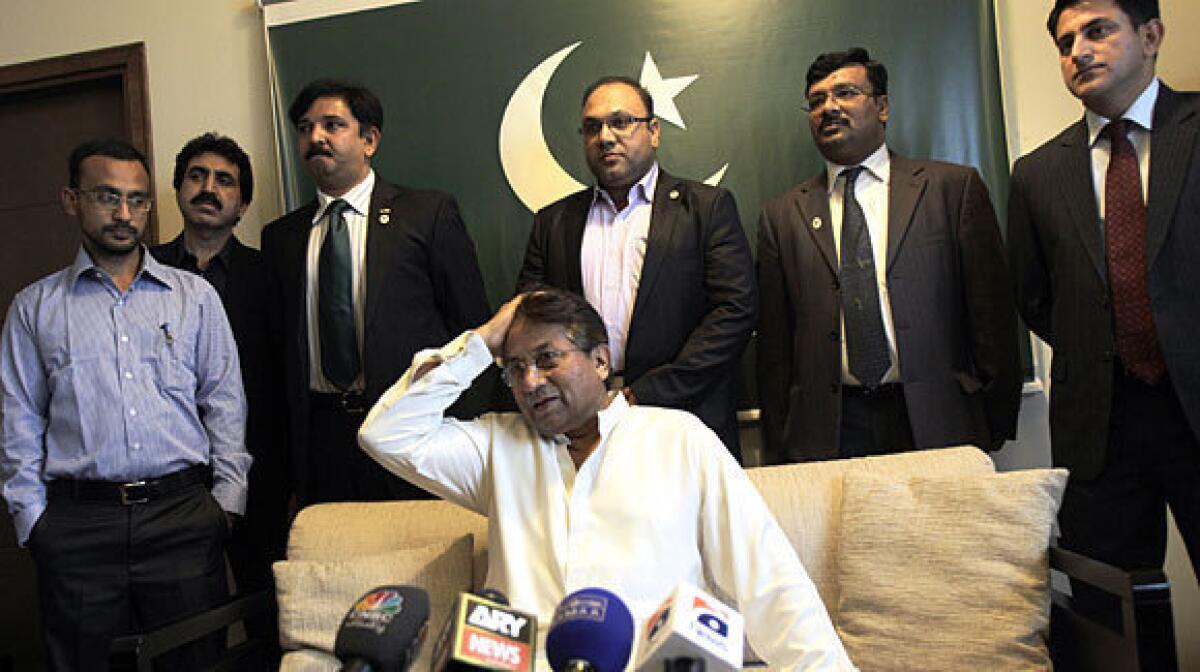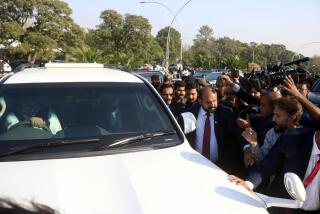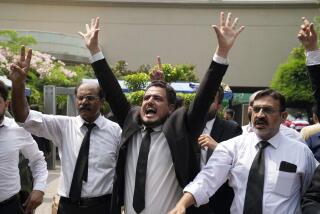Former military ruler Pervez Musharraf returns to Pakistan

- Share via
KARACHI, Pakistan—Former military ruler Pervez Musharraf ended four years of self-imposed exile and returned to Pakistan on Sunday, hoping to craft a political comeback in upcoming parliamentary elections despite pending criminal cases awaiting him and a legacy of authoritarian rule that most Pakistanis prefer to forget.
The 69-year-old former president and army chief arrived in Karachi, Pakistan’s largest city and its commercial capital, early in the afternoon after leaving Dubai. Though he faces criminal charges linked to the assassination of a former prime minister and the slaying of a Baloch nationalist leader, the most immediate peril confronting him is the Pakistani Taliban, which says it has assembled suicide bomb squads to assassinate him.
The likelihood of his arrest diminished this week with a ruling from a Sindh provincial court granting him protective bail that effectively bars his detention for the next 10 days. Musharraf is wanted in Pakistan on charges that he did not provide enough security to prevent the 2007 assassination of former Prime Minister Benazir Bhutto. He also has been charged by Islamabad authorities in 2009 of illegally detaining 60 judges at their homes. And in the southern province of Balochistan, he faces charges that he ordered the killing of a Baloch tribal chieftain in 2006.
While he could be summoned to court on each or all of those cases, analysts doubt that he will be jailed during the campaign season. Though the military has taken care to avoid any appearance of politically backing Musharraf, it also likely would take whatever steps were needed to avoid the embarrassment of its former chief being put behind bars.
“There is no evidence against Pervez Musharraf,” said Musharraf’s spokesman, Rashid Qureshi. “We have made our preparations. Our legal team is working on it and is ready to face any kind of situation. There is no reason he should be arrested because he is ready to appear before the court.”
His agenda in Pakistan includes leading his All Pakistan Muslim League party in contesting parliamentary elections slated for May 11. Pakistan’s history is marred by military coups and political ousters, and the upcoming elections will mark the first time one civilian government has democratically handed over authority to another. While he does have some support from some Pakistanis deeply disillusioned by the lack of progress in the last five years under President Asif Ali Zardari, most analysts believe Musharraf’s reputation is too damaged for him to make any kind of serious bid in the upcoming polls.
Musharraf was then Prime Minister Nawaz Sharif’s army chief of staff in 1999 when he ousted Sharif and seized power in a bloodless coup. Two years later, he appointed himself president while maintaining his role as army chief.
Musharraf stepped down from office in 2008 to avoid imminent impeachment proceedings. He had suspended the country’s constitution in 2007 and jailed thousands of opponents in a bid to neutralize political adversaries, moves that backfired when opposition leaders won parliamentary elections in early 2008. Ruling coalition leaders later declared their intent to impeach Musharraf, and on Aug. 18, 2008, Musharraf left the presidential palace for the last time, saluted an honor guard, and departed in a black limousine.
Since then, he has split his time between London and Dubai, giving lectures to Western audiences while engineering his political comeback. At times, he has set dates for a return that he abandoned at the last moment.
Israeli police dismantle Palestinian protest village
In Baghdad, Kerry urges a halt to Iran-Syria flights
Musharraf tells supporters he has returned to save Pakistan
Times Staff Writer Alex Rodriguez reported from Kabul, Afghanistan, and special correspondent Kashif Farooqi reported from Karachi.
More to Read
Sign up for Essential California
The most important California stories and recommendations in your inbox every morning.
You may occasionally receive promotional content from the Los Angeles Times.













